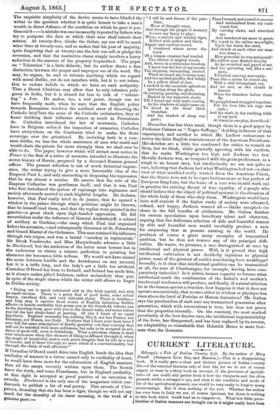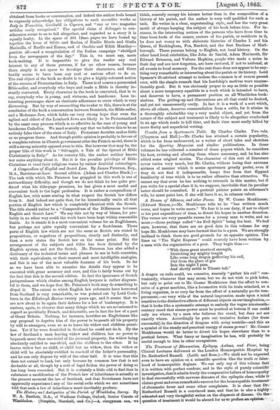CURRENT LITERATURE.
Seleaggio, a Tale of Italian Country Life. By the author of Mary Powell. (Sampson Low, Son, and Marston.)—This is a disappointing book. If it really gave a clear and distinct picture of Italian country life—of the external features only of that life, for we do not of course expect or want in a'story book an account of the processes of agricul- ture—if one could only gather from it how the vineyards and the olive grounds strike a stranger's eye, and what is the condition and mode of life of the agricultural peasant, one would be very ready to forgive many shortcomings. But it does nothing of the sort. Whether the author has ever been in Italy we are of course ignorant, but there is nothing in this book which would load us to suppose so. What few little pecu- liarities of Italian manners are brought out in it might easily have been
obtained from books or conversation, and indeed the author feels bound to expressly acknowledge her obligations to such recondite works as Italy in Transition, Garibaldi in Caprera, and "one or two magazine articles easily recognized." The special claim of Selvaggio to con- sideration seems to us to fail altogether, and regarded as a story it is equally faulty. In the space of 304 12mo. pages we have bound up together the loves of Silvio and Rosins, of Emilio Riario and Giulia Marinella, of Basilio and Emma, and of Onofrio and Edith Huntley— patriots all—and a recapitulation of the Italian campaign "abridged from the newspapers of the day." This is, we must say, mere book-making. It is impossible to give the reader any real interest in any of these persons, if for no other reason, because there simply is not space to develope their characters, and there hardly seems to have been any real or serious effort to do so. The real object of the book no doubt is to give a highly-coloured notion of the success of Protestantism in Italy. There is of course a persecuted Bible-seller, and everybody who buys and reads a Bible is thereby in- stantly converted. Every character in the book is converted, that is to say, everybody who is young, and virtuous, and handsome. Less in- teresting personages show an obstinate adherence to error which is very distressing. But by way of reconciling the reader to this, there is at the conclusion of the book a conversation between Dominick, the Bible-seller, and a Modenese Jew, which holds out very strong hope that even the ugliest and oldest of the Lombard Jews are likely to be Protestantized by the same easy process which is so effective in the case of young and handsome Catholics. We need scarcely say that we believe this to be an entirely false view of the state of Italy. Protestant doctrine makes little or no progress there. And though public opinion is probably in favour of a complete reform in Church government after the French model, there is still a strong minority opposed even to this. But however that may be, the proper title of this work is " Selvaggio, a Tale of the Spread of Bible Christianity in Italy." As for country life, the author neither knows nor cares anything about it. But it is the peculiar privilege of Bible Christians to vend their religious wares by rather doubtful subterfuges.































 Previous page
Previous page